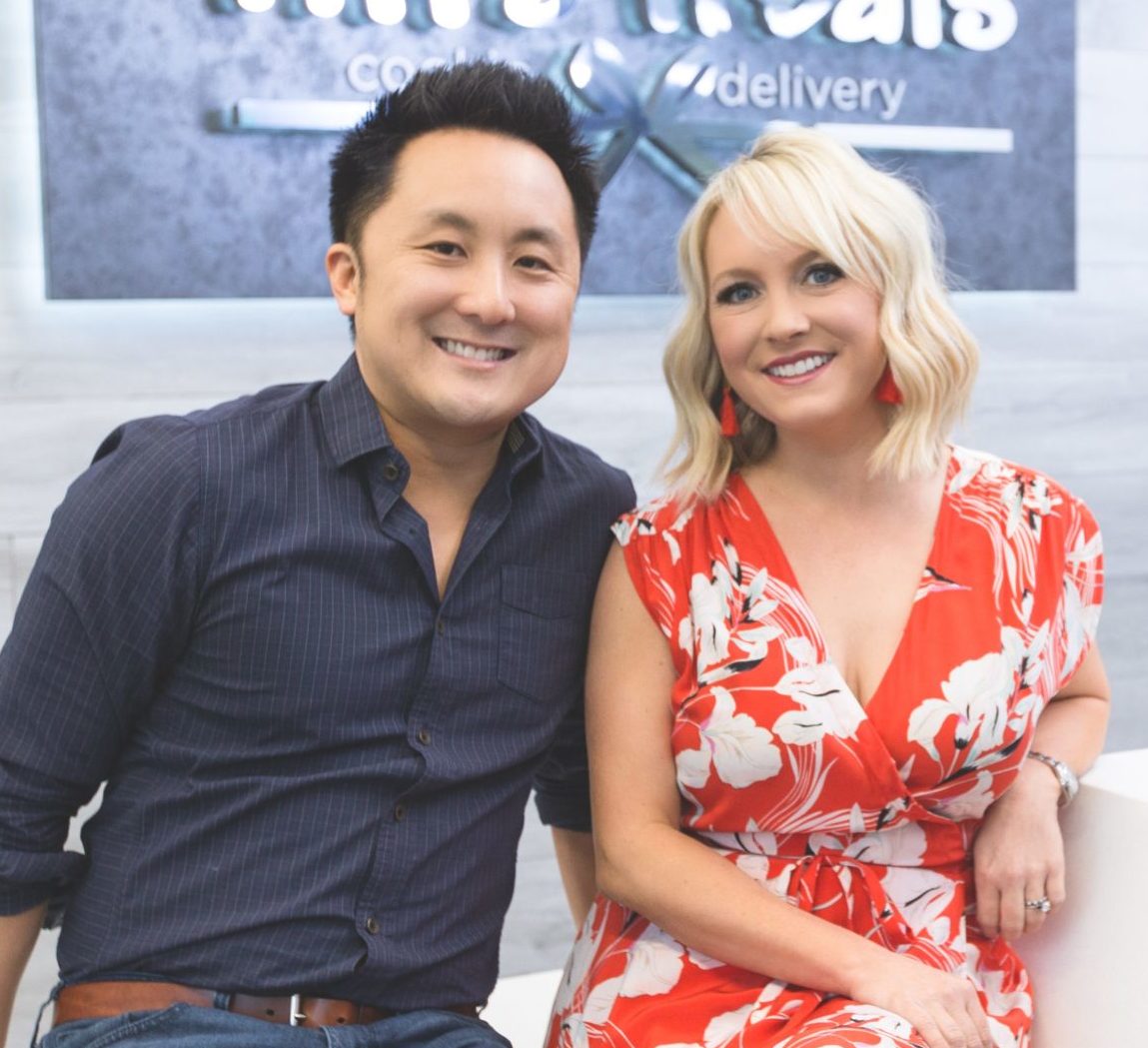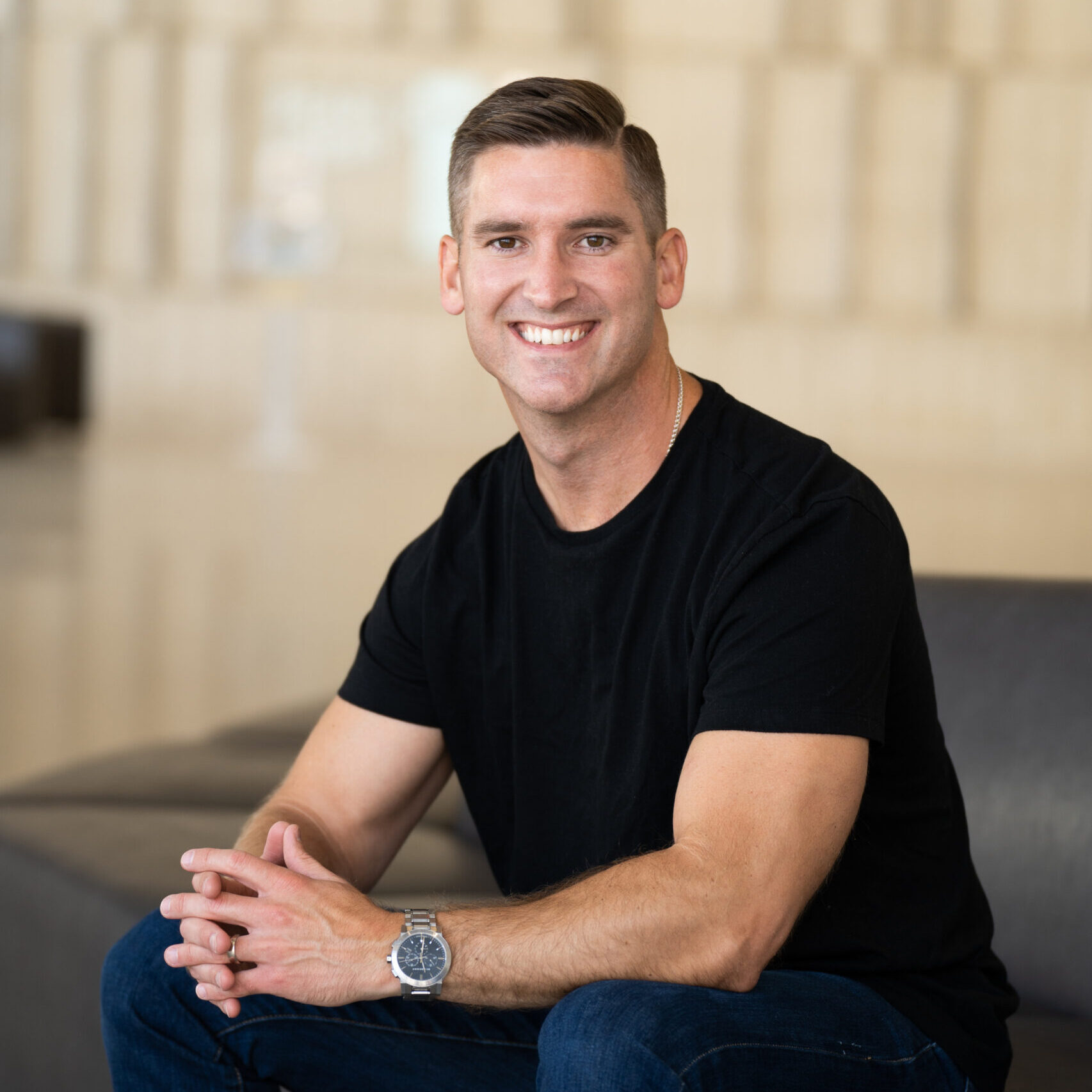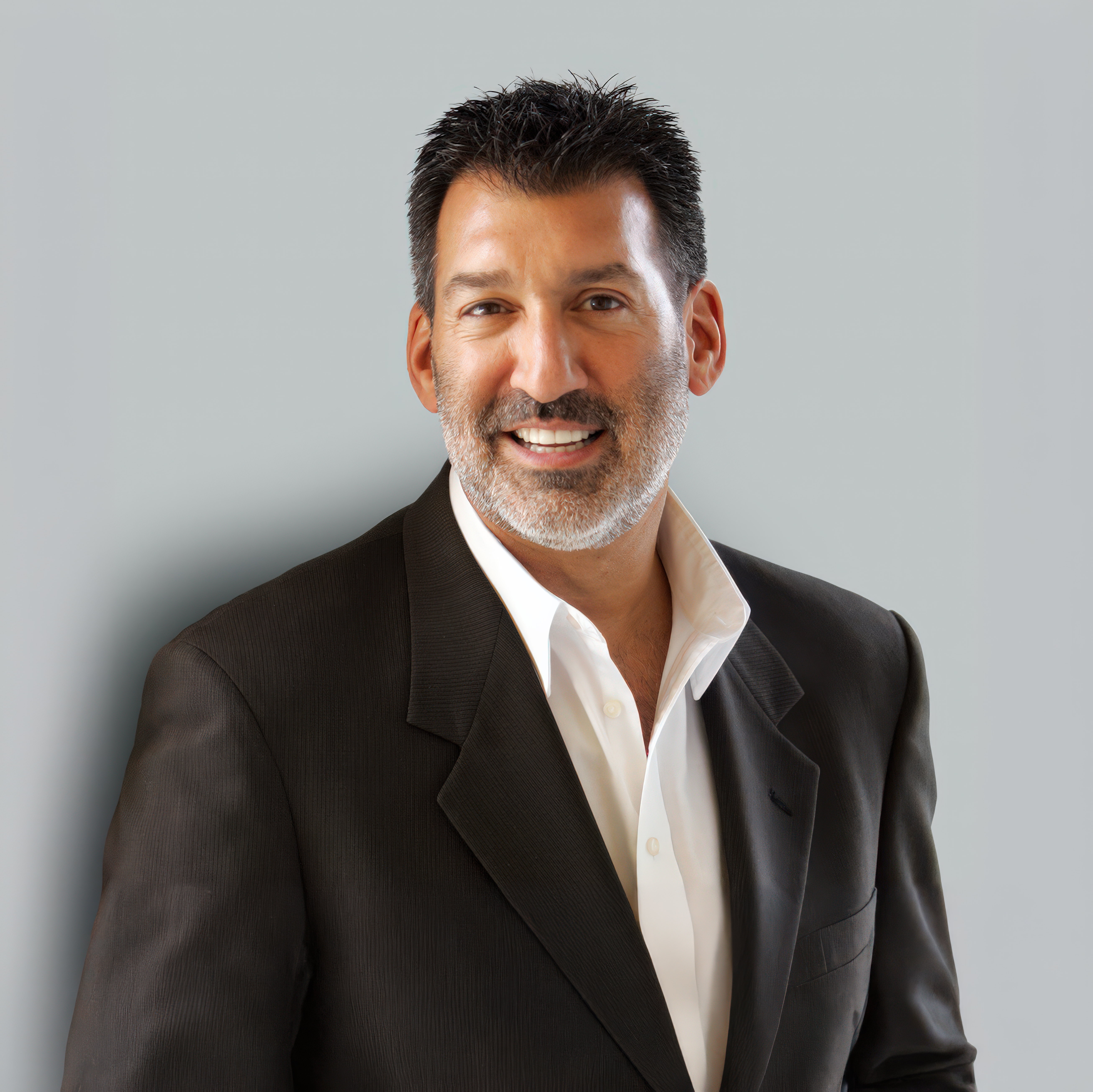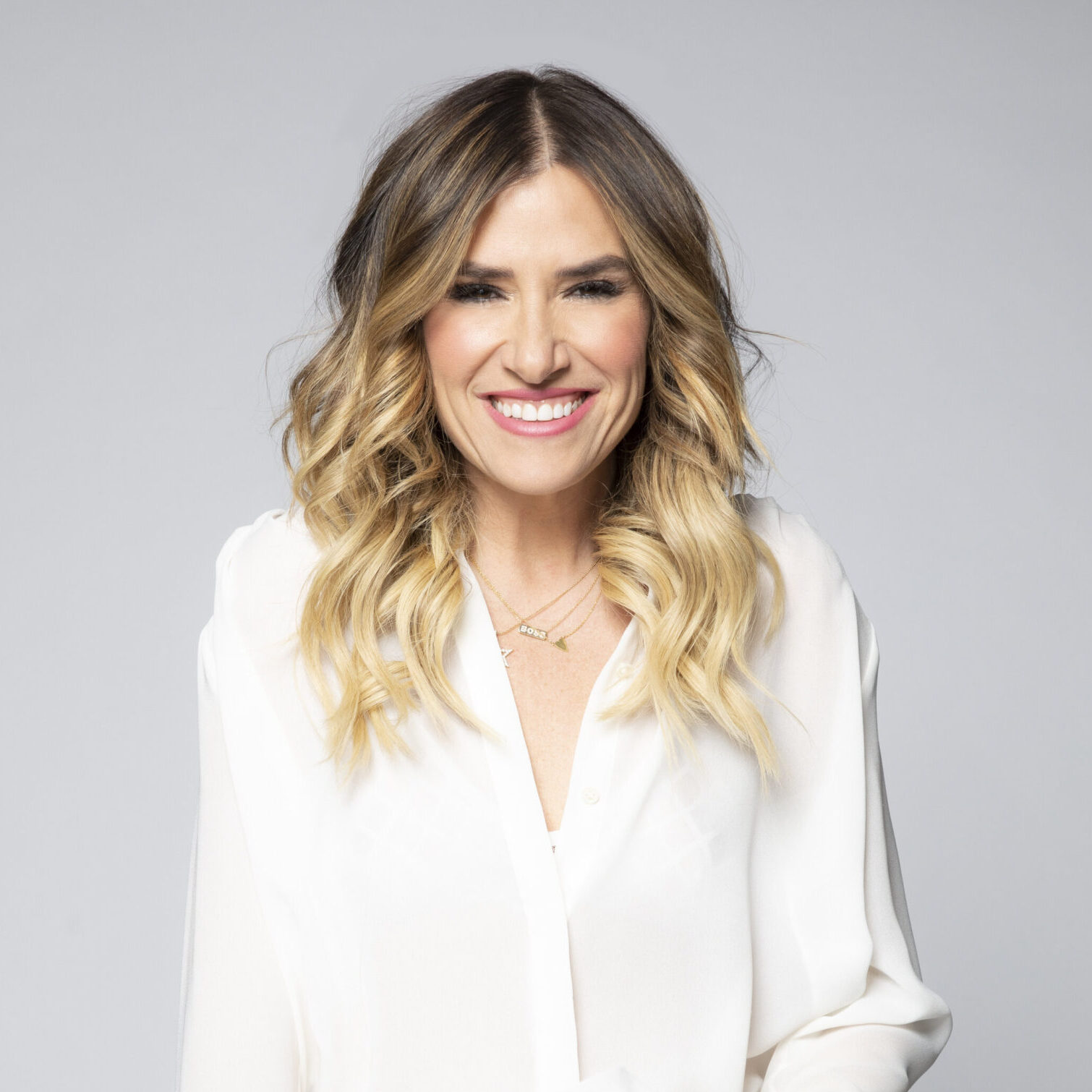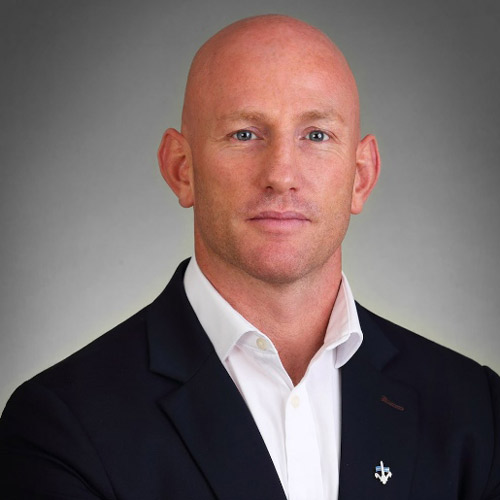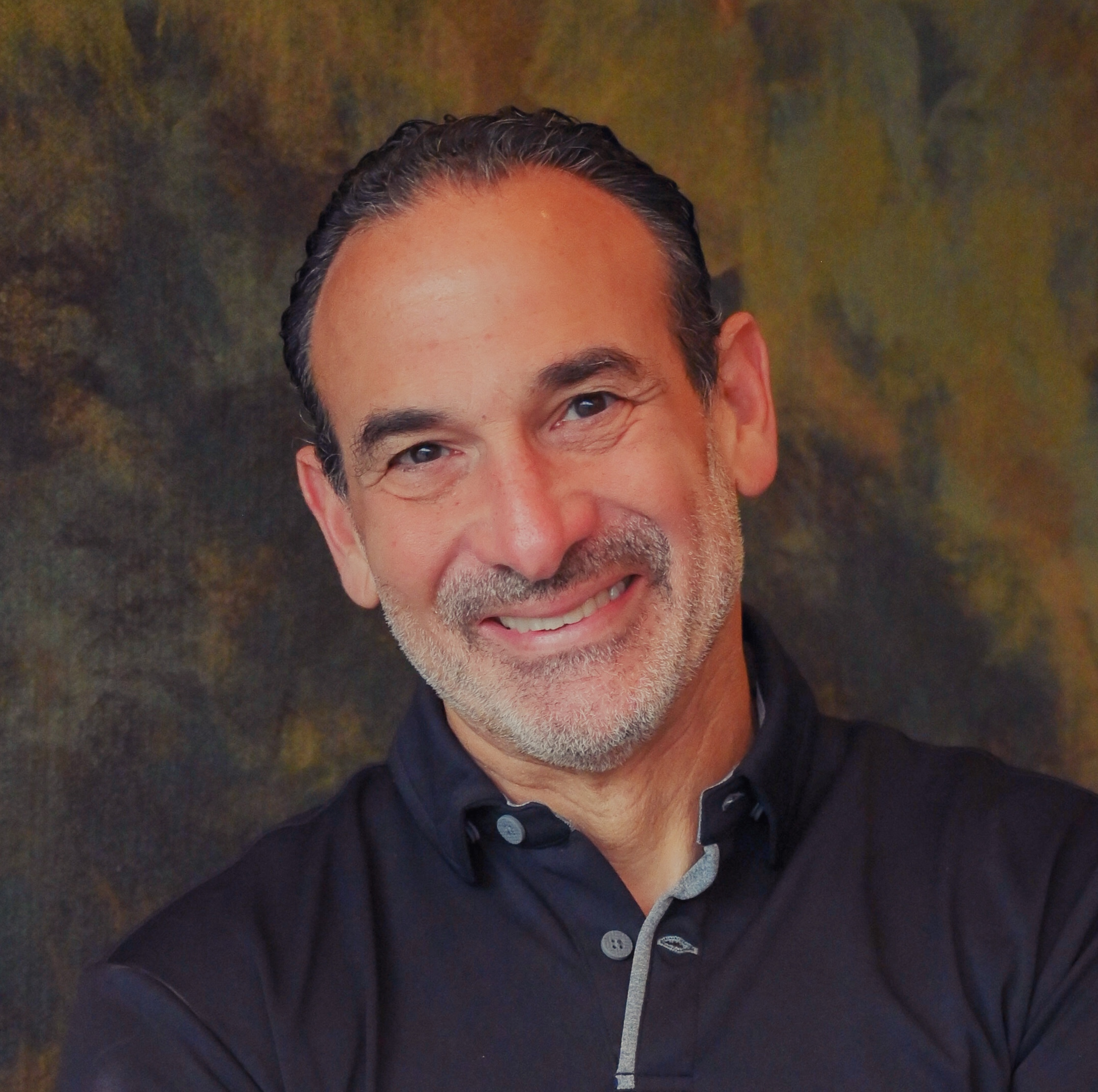AJV (00:02):
Hey everybody. Welcome to another episode on the influential personal brand. This is one of your co-host AJ Vaden here. I am so excited to have two newer friends on the show today that are about to head into a very se, a very busy season of launching their first book together. But I’ll, before I formally introduce these individuals, here’s a couple of things that you need to know and why you need to stick around to the very end of the show today. First thing is that this is a married couple in business, and as we all know, that brings lots of wonderful benefits and lots of challenges. And so we’re gonna get to learn a little bit about that, but this particular couple their business idea started from an accidental nohow on a first date. So we’re gonna talk about how a business opportunity can really come from anywhere.
AJV (00:56):
If your eyes are open to it and then not last, but definitely not least. They are writing their first book. They have been insanely successful well into the nine figures with their business, which started with some warm cookies because of a no-show on a date to a healthy nine figure business. Now they’re building their personal brands, launching their first book. So we’re gonna learn about how do you go from being these incredible entrepreneurs, being married together, raising a together, and now also writing a book and starting this new journey of their lives, sot and Leon, welcome to the show.
TT (01:30):
Thank you. Thanks
LC (01:31):
An intro. Yeah. Thanks for having us. We gotta have you introduce us everywhere.
AJV (01:36):
Well, I we’re so excited and I was such a treat to learn that we had some mutual friends in common behind the scenes, and I love learning your story. And I loved also getting to like peruse through the book. And I think you guys have really done it uniquely well in the way that you’ve like outlined these business practices and cookie recipes and all these things that you’ve intertwined. That’s just really true to who you guys are. But before we get into the book, we wanna talk a little bit of business, right? So for everyone who does not know you, so you guys are the owners and founders of Tiff’s treats, which is now a incredibly successful business. You guys have almost 70 locations across the United States. I was telling Leon right before we started that there’s one right down the street from our house here in Nashville, Tennessee, we get Tiff’s treats deliveries all the time. The cookies are spectacular, highly recommend them. My kids love ’em. My husband loves ’em way too much. But you guys have done all these amazing things, but the way you started is quite unique. And so towel everyone actually, how did this business come about?
LC (02:43):
Yeah, it’s quite simple. She was not super nice and stood me up on a date is how it really started.
TT (02:49):
Well, we were sophomores at the university of Texas in Austin, and I did stand him up on a date. But I did apologize. And the way I did that was to bake him a set of cookies. And I drove him over to his house and they just so happened to be warm when I got there, the cookies and he took one bite and immediately thought, Hey, we should do this as a business. Now keep in mind. We were 19 years old and we were going to college
LC (03:12):
And, and this was
TT (03:15):
19 99, 19 99. And so he said, we should, you know, instead of pizza delivery, it’ll be warm cookie delivery. We’ll bake the cookies when people order them and deliver them to their houses. And so I immediately didn’t wanna do that. And I said, no, thank you. But then we got to talking the rest of that afternoon and he convinced me to at least think about it. And I ended up at the grocery store pricing out. What, what do we, how much does it cost to make cookies? And what other kinds of cookies besides chocolate chip could we offer? And we spent the next couple weeks just researching the basics, you know, what, what would be the basics that we would do? And then two weeks later, we opened right out of his college apartment
LC (03:52):
And, and waited three days and didn’t get a single order for three days too. So right off the bat, I already felt like it was gonna be a failure and maybe even the relationship too.
AJV (04:02):
So I think part of this is so fascinating to me because how many people honestly get stood up on a date and one even have the courage to go and apologize much less, bring some sort of consolation gift. But then more than that, who has the idea after this no-show date to go, you know what? We should go in business together. This is an amazing idea. So I’m really fascinated to go to know, how did you guys go from, sorry, I no-showed you, I I’m really, I feel bad about this. I’ve brought you some cookies to actually, I think there’s a business here and here’s why this is so interesting to me, because to me it proves the point that there is an idea in every single situation, there’s an opportunity to be creative and to do something. And no matter what happens, good, bad or whatever, and think most of us don’t see it, but you guys did. So how did that happen?
LC (05:00):
You, you know, I think the easy answer for that is we were 19 and you need to be a little bit naive. We call our, we call it, we call it young, dumb and naive. You know, you don’t know what you don’t know. And I think as we age that the 25 year old version of ourselves, would’ve said, no, like that’s too insane of an idea, but when you’re that naive, you just have no idea the hardships and the difficulty. And you don’t think in terms of why we shouldn’t do something, you, you, you’re just thinking the world is your oyster. And I think that that was weirdly our biggest advantage is that you, we just were just naive.
AJV (05:41):
I love that. So I’m curious Tiffany, why did you take him cookies? Like why even go back and apologize? Like you could have just easily been like, oh, I’ll probably never run into him again up.
TT (05:54):
So I should clarify. We were dating at the time.
AJV (05:58):
There
TT (05:58):
Wasn’t a random, because that would be bizarre to just nohow and then apologize and then go into business. So we were dating and cookies was my thing. So I used to all through high school, I would, and even junior high before then it was just my hobby to bake cookies. And so when I needed to apologize, it came naturally, this is something nice I can do for him to say, I’m sorry about this. And I certainly always expected to see him after that. I did not think we would be going into business together or
LC (06:27):
Getting married
TT (06:28):
Or that happens way later. So yeah.
AJV (06:32):
Well that does make a lot more sense reading this. Cause it did say an accent, dental nohow in your bio. And I was thinking, I dunno what accidental means, but I do know what nohow means. So I’m curious though, just something that you said now, you guys have two kids. How old are they?
TT (06:50):
Seven
AJV (06:50):
They’re seven. So I have a two and a four year old. Oh
LC (06:53):
Yeah, you’re
AJV (06:54):
In. And so, yeah, we’re in the thick of it. But I’m curious new knowing this about yourselves of going, Hey, when we were 19 thinking that the world is our oyster and it’s more about what we can do, not what we can’t do. And even saying that maybe our 25 year old selves would’ve said, no, I’m curious to know. It’s like hindsight 20/20 with all the success that you guys have had and all that you challenges that you’ve overcome. What would you want to instill in your kids about keeping this kind of, what is possible mentality versus can’t do it mentality?
LC (07:29):
It’s funny cuz when it comes to our kids, we’d probably be like, just be in accountant, just go into something safe. Like we, you know, we, you
TT (07:38):
Can definitely, I see why parents do that. Yeah. Right. Cause the looking back on it, the odds of it going poorly were so much more in favor than the odds of it going the way it did ultimately go. And there’s so many chances along the way, one tiny tweak and it wouldn’t have gone this way at all. And so I think as an older person, you see that you can see the whole playing field for your kids. So it’s scary for you to even want them to have their eyes quite open. Yeah. But you should. I mean, yes you, I think you’re right. You, we should absolutely in, in instill that in them to, to have that dream. And I think that’s that’s to us to knowing better not to crush in anyway.
LC (08:16):
Yeah. And it might even be harder for us to, to say, go ahead, do it because we know what that really means. We know the hard we used to, we used to joke about the things that we had to go through to make this business work. You wouldn’t wish it on your worst enemy, you know, it’s that stressful. It’s that intense. And so it is hard to hard to think that man, our kids might go through this, but again, you definitely want them to realize their dreams that’s for sure.
AJV (08:43):
Yeah. Well I would say it’s being on the entrepreneurial journey in our own business, that’s like, yeah, there’s lots of ups and downs. And I can’t remember who said this, but someone said being an entrepreneur is like jumping off of a cliff and building the parachute as you plummet down to the ground. Right. That’s exactly it. And you guys clearly have figured this out. You guys are 500 million. You’ve got famous people all across, you know, you’ve mark Cuban, you’ve got Brooklyn, Decker, Kendra, Scott, all these people advocating what you guys are doing. You built an incredible brand and for those of you who don’t know, it’s like T streets have cookies. They deliver them warm, they’re cooked and delivered within an hour of them being baked. We get them as appreciation gifts all the time from vendors and clients. And I’m, I’m curious to know, it’s like at what point did you guys go, okay, I think this is gonna work. Like, was there a moment that you’re like, I think we’re gonna make it here.
LC (09:44):
Well, before I answer that, I, I need to clarify. I don’t, I do not believe mark Cuban is an investor. We have Navitzky of the Mavericks. Mark has been gracious to give us some good advice and everything that we have Derek and Kendra and, and rod Brooklyn Decker. But yeah, maybe mark, you shouldn’t invest if you’re listening to this,
AJV (10:02):
Your chance.
LC (10:03):
Yes. but to, to answer your question, I don’t feel like we still feel like we have it, I think, and you know, that maybe part of I’m I’m, maybe we’re afraid to feel that way because for the longest time that kind of is what kept us going. And so you know, we need a, we do need to stop the smell of roses, so to speak more often.
TT (10:26):
Yeah. I mean, when your goals are bigger than where you are, then you never feel like I’ve done it or it’s going to work or certainly never we’ve made it. We’ve never won once for one second, felt that the whole way through, I think there were times when we could see that perhaps one store was viable in the beginning. It took a while, but I would say five years in what we had always said is we were busy in certain chunks of the day. And then we were not busy in other chunks of the day. And we had said, if we can just get this busy during this time period, then we’ll know we’ve done it. And eventually we did that. And I, I think that was the starting point of thinking, well, okay, at least th this would work. I mean, they, but we always had dreams of expansion.
TT (11:12):
And so I think we go into it in the book a little bit that as soon as we got some, our footing under us a little bit, then we would take a next bite, which would then make what we had done now completely at risk. So we never were in a position where, okay, great. We could buy a house and pay those payments and we’d be fine because we always have this, whatever, because whatever next step we did completely could have put out of business already, what we, but that’s kind of the only way to grow.
LC (11:40):
Yeah. The, the, the margin is in the risk. Right. And so that’s the way we look at it. Now we are trying to keep things in perspective on really stressful days. I, I do, I do think back and say like, look, we’re so fortunate to be where we are today. And if, if you know, you told 19 year old me, we’d be at this stage. And I would just say, okay, I take it. You know, but when you’re in the moment, it’s hard to keep things in perspective.
AJV (12:06):
What would you guys tell someone who is wants to venture out and start their own BI business, whatever kind of business it is. Like if there was one entrepreneurial lesson that you would wanna impart on someone else just getting started. Do you guys have any idea of what it would be?
TT (12:24):
My, what comes to mind for me is don’t do it unless it can be your number one priority or your number one focus, because if it’s purely a side gig and there are several other things that are legitimately more important to you, it’s not that you can’t do that, but it’s gonna be very, very difficult to make that a smashing success.
LC (12:44):
Yeah. Now you could start as a side gig, but know that if you want to make that next step, it, it might mean making some really difficult life choices. For me, when it comes to tactical strategic of the business, it’s along the lines of focus to one of the mistakes that we probably were best at not making that it’s harder to make the bigger we grow. And we see a lot of businesses of all different sizes make, is focusing on being absolutely great at a very narrow niche. And especially as you become more successful as a business, there’s more and more opportunities and different opportunities. And I I’ve, we’ve seen businesses really falter by trying to get into doing too much instead of focusing on that niche.
AJV (13:31):
Oh my gosh. I’m so happy that you guys said that, cuz that’s like one of the things that we talk about all the time to our audience here at brand builders group is you know, my husband has this saying the more specific, the more terrific, right. It’s like that is right. But it’s like there’s power and being known for one thing. Yep. And then doing that exceptionally well, which to your point, Tiffany, it takes a lot of focus and intention and you can’t often achieve excellence if you have divided attention. Right. But it’s really focusing in on what is it that we really wanna be known for. And so for you guys, what do you guys wanna be known for when you think about T’s treats and then your own personal as individuals, what do you guys wanna be known for?
TT (14:19):
Well, it started and, and still is being best in the world at, on demand, warm cookie delivery. And we feel that, you know, we have been able to do that. And then we’re sort of opening up now a little bit to being best in the world at, on demand gifting know with, with warm cookie as the base. But what we realized it’s really about that giftable moment, that moment of connection between people more so than it is really just about the cookie, but we started with the cookie.
LC (14:47):
Yeah. Well, we’re what we realized on a, almost on accident that we’re very good at is making sure that there’s this incredible moment, the intended moment, whether it’s you’re at the office and you just need some downtime and you and your coworkers order some cookies. And for that brief 10 minutes of your day, it’s awesome. And you’re talking or across the country and your best friend have a tra has a tragedy or something or they’re sick or something’s going on. And you’re able to go online and send them a box of warm cookies with a message that’s super meaningful. We’re very good at making sure that those moments are, are intact. And that’s what we want to be known for what we call it, connecting people through warm moments.
AJV (15:36):
Yeah. I love that. And I think the, to me, it’s like the ultimate uniqueness in all of that is this on demand component. Right? It’s, it’s so easy to have great intentions with really poor execution cuz you miss this window of opportunity. And you guys provide this real, really unique opportunity to do it in the moment. And it’s, to me, it’s like with the cookies at least, right? It’s like, it really means something to have warm, fresh cookies come and it’s like, oh man, like these are fresh. Right. It’s like, yes. And it makes you wanna eat them right then. Right.
LC (16:10):
And for the like, I’ll give you you an example that we put in the book, just a quick story. We started to realize how powerful these moments could mean when early on we had someone from a downtown office, an admin call to place an order. And she was talking to our manager who was taking the order manager was like, oh, what’s going on? How are you doing today? And she’s like, oh, you know what? We’re ordering these for my boss. And it’s raining today outside. And whenever it rained, my boss always loved to tell us a story about when he was a little kid, his mom would bake him cookies every time it was raining at school. So he knew when he came home from school, there’d be a batch of warm cookies on a rainy day. And she went on to say, well, this is the first day. It’s rained since his mother passed away. And so we’re here in the office, we’re all gonna celebrate and order some cookies. And so we realized right then and there in the, on demand nature, we were able to get cookies to the office while it was still raining and the whole company had a moment together for their boss. And so that’s the kind of power we see in these moments.
AJV (17:11):
Oh, I love that. Y’all and I think some of, of this what I love is like the, the way speaking of the book, right? The way that you’ve outlined this book I think is so interesting. As you look at all the chapters, clearly there’s business principles and there’s all these things, but then also you have incorporated recipes for every chapter. So this has been on my mind ever since I was fortunate enough to get a gal copy of your upcoming book, are the recipes somehow directly connected to all the lessons in each chapter?
TT (17:44):
Not directly, we started with chocolate chip because that’s the base. And that’s, you know, you gotta have chocolate chip. So we knew we had to have that one first. And then we sort of grouped them based on cookie. And then we’ve got kind of a grouping of bars. We’ve got some truffles. And so they’re kind of grouped based on category a little bit more than, than story related.
AJV (18:05):
Oh my gosh, this is so funny cuz in my mind I’m like, what’s this secret message behind yeah. For each of these chapters. And so OK. Well there’s one chapter in particular that I think is going to be really relevant to our audience as we kind of talk about building a business, building a brand and you guys have a chapter chapter four called building a brand and I would love to know like what, what is your philosophy on building a brand?
TT (18:34):
Yeah, I think gosh, building a brand is so delicate and I think that’s the biggest takeaway for us is that when we started, we were building a service and we weren’t considering building a brand and kind of what that afforded us was the ability for some breath space to let customers tell us what was meaningful to them. And we were able to sort of shape the brand in reverse. Not us saying here’s what we are. I hope you like it. But we sort of started with the service and then shaped along the way. And then some of the things that happened during that were really, you know, the warm was the, was the biggest shaping piece, realizing why people were using us not just what they were buying or when they were buying, but what it was meaning to them. And that’s the piece of the brand puzzle.
TT (19:25):
I think that’s so important to us and we’re the two ambassadors of the brand. We’re the protectors of the brand. And there’s tons of other people here that are as well. But then there’s always gonna be a along your journey, other people that are protectors of the bottom line, other people that are protectors of the expenses, people that are protectors of, you know, are the legal yeah. And some of that can be at odds with what you want for the brand. And so sometimes it can be challenging, especially if you get to, let’s say the board of directors level because they’re not there every day and really that that’s not their role, but it is your role because to us, at least without the brand, you have nothing. And so sometimes you have to really fiercely protect, say, listen, I know by doing whatever this program, if you wanna put in place, we will make more money or we will save more money or we will, whatever it is. But I’m also telling you that that is not right for the brand. It’s either not right for the customer experience. It’s not right for the overall our connection with our customers. It doesn’t speak to us and what we believe in and you have to stand up and say, we’re gonna make choices that sometimes don’t make financial sense, but that do make sense for, for our brand.
LC (20:35):
Yeah. We always think of it opposite from financially, but cash and revenue today is less important than cash and revenue tomorrow next week, next month, next year, that’s not true when it comes to financial world, but when it comes to building a brand, your, the, the more important cash is what is gonna come in later. And so we delay a lot of revenue. We delay a lot of sales. We could, you know, we’re at 75 locations. Now we could be at 200 locations right now, if all we cared about was revenue, but it’s equality experience that we care about. And that makes our brand special is the white glove service. And so for us, that’s delaying a lot of things that a lot of businesses, it takes a lot of what am I trying to say, willpower willpower. Yeah. To, to go at the pace that is best for the brand. And so that’s really something that we have to remind ourselves the, the kind of the bigger we get.
AJV (21:34):
Well, yeah. And I would say that’s quite rare, right? It’s easy to be tempted into grow quickly, right? Double revenues, double locations. Yes. But growth doesn’t always mean scale. But I think that’s good. So I, I have three follow up questions to this. So Tiffany, you mentioned we really let our clients kind of tell us, so for anyone out there, who’s listening to this episode going, well, how do you do that? So how did you get that information from your clients?
TT (22:07):
So in the, the beginning, you know, we were taking all of our orders by phone. So you actually have a phone conversation with people. So, you know, that’s not relevant today, but truly you could hear why they were ordering. And especially, let’s say when we started, we were focusing on the university. And so we had a lot of parents calling in and I’ll tell you, they want to tell you everything about why they’re are ordering. You’ll be on the phone 15 minutes because they’re ordering it for their college age child. And there’s nothing more exciting and, and more fun for them to chat with you about. So a lot of times customers do want to chat, but in a more modern way it’s social media comments and, and people are very free about emailing in. They will email you, they will live chat.
TT (22:47):
You, they will put comments on social media. You just have to read them and listen to them. And, you know, I don’t know if this is surprising or not, but we get so many positive stories coming in out of the blue and just say, Hey, I just wanted to let you know that I, I did an order and this is why. And it was so meaningful me to me because of X, Y, and Z. And we get that a lot. It’s, it’s a fun place to, to see all this neat humanity, right. That’s there. And sometimes you, not, everybody gets to see it,
LC (23:16):
Especially these days. Right. We get to,
AJV (23:19):
I mean, that’s the good stuff, right? It’s like but I love that. And it’s, I think for everyone listening, like the takeaway is create opportunities to actually hear the stories of your customers, right. If thing is, how quick can we do it? How can we get you in and get you out? It’s like, you’re gonna miss the humanity, the actual reasons why you’re doing this. And let those help shape and form how the business grows. And I love that. The second thing that you kind of both alluded to a little bit is this idea of being protectors of the brand. And I love that so much because I like one of the things that we believe in really strongly at our company brand builders group, is that the individuals, right? The owners of the company, it’s like your reputation is the most important thing.
AJV (24:04):
Same thing as a company, it’s like the reputation is the most important thing that you can have. And so to consider yourselves as the brand protectors is a really incredible concept. And so I’m curious, what would you tell other business owners out there when it comes to, Hey, it’s like many people will have different roles, but there needs to be a brand protector, someone who’s going to, you know, create garner, establish, and then protect the reputation that you’ve worked so hard to build and other people’s opinions start to come into play. Any tips, insights, advice you would give to someone on how to do that.
TT (24:44):
Yeah. I’m gonna start really quickly. Then I’ll hand it off to Leon. But one of our values that we have up on the wall is we protect the brand. Hmm. And so I think part of it too, is it doesn’t have to be just the two of us. So we’ve got an army of people that believe in what we’re doing and believe in those values on the wall and know that we protect the brand is one of them and are there to help catch you when you are tempted or you are making, you know, if, if you have an environment where you’ve got people close to you, that can do things like that. We recently, well, a couple of years ago had a big decision to make. And we had people come to us and say, look, the answer is we protect the brand. And there’s only one choice between these choices. There’s only one of these two things that protects the brand. So while it’s gonna cost us $20,000, how are you gonna make any other decision besides that? And so it’s really helpful to have people buy
LC (25:37):
Into it. Yeah. When you set your own, when you set values for your brand, that you truly believe in and your team believes in, they hold you accountable, as much as you hold them accountable. And specifically what she’s talking about is on our milk bottles, we have brand new, beautiful milk packaging. Somehow some way we let it slip. And the word pasteurized was misspelled very small somewhere there. And it was so tempting. We’re like, oh, we could just send it out and let someone call us. And, and, and we, you know, we know, and our team was like adamant, no, I know it’s $20,000, but you know, we protect the brand. We protect the brand and, and, and part of that, you have to get really good at being okay with saying no to a lot of ideas and a lot of thoughts distinguishing, just because an idea is good. Doesn’t mean that it deserves a yes. Oh, that’s good. You say saying no to good ideas all day long. And that’s really hard for a lot of people to, to, to understand because they’ll they’ll think, man, my idea was good. I don’t understand. But if you say no to every good, I there’s millions of good ideas, you gotta really hold out for those monumental great ideas.
AJV (26:50):
Oh man. I think that is such a good reminder and lesson for not just people in business, just humans, it’s a learning what to say yes to and what you need to say. No. Oh, to that’s really good. Y’all, I’m so excited for this book to come out. This is your first book together. What on God’s green earth made you guys decide to write a book and do it together? I’m so curious, like what instigated all of this?
LC (27:19):
Well, what
TT (27:20):
Instigated, I mean, we’ve been part of it is just kind of getting our story down because we’ve been doing this for a long time. Now this is our 23rd year of business. And so we have a lot of stories and at a certain point we wanted to kind of get those on paper. We, yeah,
LC (27:37):
We do. From time to time, we do speaking events, corporate speaking events, and we go speak to some university classes and stuff and we get a lot of interest. So every chapter in the book is based on what do we get asked the most people wanna know? And that’s why it ranges the, you know, from business to building a brand, to working together with your spouse and having kids and raising kids it’s because people are the most curious about that. So we kind of just said, let’s put in one book what everyone is most curious about. And so it’s from our experience in talking to people really what we wanted to write about.
AJV (28:13):
Mm that’s good. How has it been? So so many of the people in our audience are on the journey of publishing a book, want to publish a book, how’s it been?
TT (28:23):
It’s, you know, it’s so interesting because it’s a totally new industry and you’re learning it. And there’s so many facets to it that I feel like if there were a second book, then you kind of know everything. Yes. And there’s just so many small things that I would do differently only because I didn’t understand the process. You know, and I’m like, don’t hard. Well, it’s too late now. I can’t change X, Y, or Z, but if we ever wrote another book, then now I know here, you know, here are the things I, I would’ve, I would tweak. But it’s fun. And, you know, it’s fun to, to do something.
AJV (28:59):
If there was one thing that you could go back and do differently for you, what would it be?
TT (29:05):
You know, the thing that comes to mind to me is understanding the editing process better and sort of curating that initial draft in a different way than, than what we did and what we ended up doing was turning in something more rough than I would’ve. And, and then kind of the editing process got sort of squished to the end and then in a rush because it had to go to print at a certain time. Yeah. So I would maybe almost like do an internal editing, more internal editing before turning a draft.
LC (29:38):
Cause our editor was awesome, but we misunderstood that process, how it would run and,
TT (29:45):
And the timing of it too. Yeah. The timing, you know, so yeah. We misunderstood sort of the timing of when do those edits happen at what cadence do they happen? And so it ended up being more truncated in terms of timeline than I thought it would be, but you know, all came out great. It just wasn’t wasn’t I didn’t realize the, the, the timing.
AJV (30:05):
Oh yeah. I remember when we wrote our first book, which we celebrated 10 years ago in February. So just last month. I remember we turned in, I don’t remember how, like how many thousand words it was like, you know, 80,000 and like they came back and gave us like 50 and we’re like, that’s like a third of the book. Like you read a third of the book and it was like such a aha moment of you just never know. And it’s like, we wrote it as if like this is going to print.
LC (30:36):
Right, right.
AJV (30:37):
Yeah. It’s like, indeed, no, like a third of that is going to print. We will help rewrite the other half. And we did
TT (30:45):
The opposite opposite. Yeah. Where we turned in, what we thought we knew our, our word limit. So we turned in about 10,000 extra words to that, that way we’ve got buffer cuz we knew stuff was gonna get cut. And we thought it was just gonna get torn apart, ripped to shreds, put back together and we were ready for that. And then didn’t and so that’s the thing that we were like, oh shoot, we should have turned in something a little bit more ready to go.
AJV (31:09):
Oh interesting. Yeah. We went through reverse. And it was a very eye opening experience.
TT (31:14):
That would be tough. That what we
AJV (31:17):
Very and very wordy and we needed to
TT (31:23):
Yeah, you gotta yeah. Truncate what your, you don’t need 10 words to say one thing. Yeah.
LC (31:27):
That’s my problem. I, I, I went too crazy with the extra words and comas and run ons and stuff.
AJV (31:34):
So since so many people in our audience are on this path to publishing a book, I’m curious if you guys were to write another book and you could have different answers on this. My husband and I often disagree. It’s a beautiful part of being married. Lots of disagreements. Would you guys self-publish, would you want to traditionally publish again or do something in the middle and why?
LC (31:57):
You know, I, since we don’t know what self-publishing entails, it’s hard to kind of say we liked having are handheld a little bit for sure. Yeah. With, with the publisher I, I really wouldn’t be able to know.
TT (32:12):
Yeah. And also since we haven’t really, yeah. We haven’t gone through the full cycle, but I think I would go publish again to Leon’s point to have somebody to handhold. And, and, you know, especially, even from the printing end and all of
AJV (32:23):
That. Oh yeah. Just a guide through the process. Right. I love that. All right. Well, I know that we are approaching the end of our time here. But I want for you guys to have a chance to tell everyone who’s listening, what this book is all about, who it was really written for and why everyone needs to go grab a copy.
TT (32:44):
Well, the book is all about our story, our journey, and I would say number one, our failures we’re pretty open about the failures that we’ve had along the way, and some of the mishaps and hoping to give other people some not tips, but just inspiration and, and get a little bit out of that of, of maybe what not to do or, or maybe just inspiration that it happens to other people too. And then of course, gosh, the recipes are really fun and they’re very easy. So you don’t need to be a baker to pick this up and get some really great results out of the book. And anybody’s, who’s a also interested in sort of peeking behind the curtain of what a husband and wife team looks like. We tried to be as honest as possible. So
LC (33:25):
I too honest,
TT (33:27):
Too honest,
LC (33:28):
And it’s a beautiful, full color book. It’s a great coffee table book. The pictures are the, the baked goods, pictures are beautiful in there. So it makes a great gift as well. We wanted to have just something that people would be proud to have sitting on their coffee table. But also with substance beyond just pictures.
AJV (33:47):
Ah, I love that. Who do you think is the ideal target for this book?
TT (33:53):
I think anybody who ha I don’t think you have to have a strong interest in business, but anybody who’s a little bit curious about business and really just wants to see sort of the honest side of what goes on behind the curtain.
AJV (34:08):
I love that. Well, I know from even just spending the little bit of time getting to know you both and then even in the interview today, I think one of the reasons that everyone should go and check out this book is the fact that you guys created an entire business off of an apology effort and creating those opportunities in everyday life to go, there is an opportunity in everything that happens if we are just willing to keep an eye out for it. And then I think the best part of all of this is that you guys are so transparent and honest to about, it’s not easy, let’s not kid ourselves. But at the end of the day, it’s worth it. It’s worth it. Yeah. Yeah. We’re so excited. This book comes out. What’s the official launch date,
TT (34:55):
April 5th,
AJV (34:56):
April 5th. So I mean, we’re here. It’s like right now. So I, I would encourage everyone. We’ll put this in the show notes, but go to cookie delivery.com/vaden. That’s our last name? V a D E N. So cookie delivery.com/vaden. They have given us some awesome discount codes. You can get 20% off actually ordering some tips treats. There’s also a link right there to go and buy the a book y’all need to do it. Learn some, learn from people who have been on this journey, who are doing the thing. They’re building their business, growing a family. Now they’re launching a book Tiffany, Leon, thank you guys so much for being on the show. This was awesome.
TT (35:36):
Thank you so much, AJ.
LC (35:37):
Thanks for having us. This is awesome.
AJV (35:39):
All right, everyone, we’ll catch you next time on the influential personal brand.

